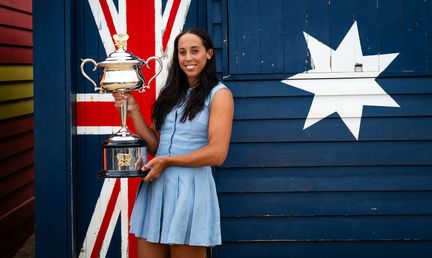Typically, Grigor Dimitrov would have been loosening up in the gym, focusing all his energy on his upcoming match with Stefanos Tsitsipas. But last Thursday, in his role as Team Bulgaria’s captain at the United Cup in Perth, he was trying to think through the repercussions of the left leg injury suffered by his No.2 singles player.
After Isabella Shinikova was defeated by Despina Papamichail in three sets, Dimitrov pulled on his player hat -- and went a grueling three sets with Tsitsipas, in a match decided by a third-set tiebreak. Now that was a lot to process for the captain down 2-0 to Greece.
“I was just actually talking to her,” Dimitrov told reporters after his match. “I obviously need to reassess a bit more of how I think just overall legs are and whatever the issue is to that extent, and then I think I’m going to make a better decision.”
In the end, being a professional tennis player is a solitary existence. You are alone on the court, problem-solving for the most part on your own; the coach, the physio, the strength expert, even the psychologist are beyond reach in the most crucial moments that determine success.
But what happens when you’re suddenly responsible for an entire team of athletes? Individuals with a wide breadth of personalities -- and talent, too? How do you tend to their physical and emotional needs and still do what’s right for the team? How to make sure the sightseeing excursions and mandated appearances aren’t too taxing? And perhaps most importantly, what’s for dinner -- and where?
“Well, I have taken the role, so I need to take all the hits that also come with it, I guess,” Dimitrov said, smiling, after losing to Tsitsipas. “It’s a little different; I’m not going to lie.”
Dimitrov is hardly alone. Seven of the 18 teams that were assembled in Perth, Sydney and Brisbane were captained by active players. They were a disparate group -- a three-time Grand Slam champion and Olympic gold medalist, a 22-year-old Challenger player, a 22-time doubles champion, a 38-year-old who won the 2011 US Open and, perhaps, the most unlikely captain in tennis history.
Here are their stories:
Samantha Stosur, Australia
When the concept of the United Cup staged in Australia first surfaced, Samantha Stosur was all in -- as a player. Her credentials were impeccable; she won the 2011 US Open title and is the only active Australian player with a major singles crown.
As it turned out, her vast doubles experience would help prepare her for the eventual role that Tennis Australia had in mind. Stosur was a co-captain with the great Lleyton Hewitt.
“Co-captaincy is just a relatively new spot for me,” she said, “so I’m trying to enjoy both roles.”
Stosur has won 28 WTA Tour doubles titles, a feat that demands something far beyond self-awareness.
“We’re out here to do everything we can possible to try to win this competition,” Stosur told reporters before Team Australia was knocked out in the group stage. “No, it’s not going to be easy. There’s many great players here. But we’re ready to go and we're going to give it everything we’ve got.”
Alexander Bublik, Kazakhstan
The descending ball was imminently slammable, but Kazakhstan’s best player -- as he often does -- had something else in his mind.
At the last second, Bublik grabbed the frame of his racquet with two hands and punched the ball over the net by hitting it with the handle. The ball went in -- a remarkable play in itself -- but Lorenzo Sonego eventually won the point, game and match.
Bublik has a history of, well, let’s call it irreverence in the genteel sport of tennis. What will the 25-year-old -- who hit a career-high No. 30 in the rankings after winning the title in Montpellier, France, last winter -- bring to the captaincy?
“For me it’s the first-time event, team event, so I try to make it as funny as possible because we have so many serious events during the year,” Bublik said. “It’s one more week to enjoy a little bit different type of tennis.”
Kirsten Flipkens, Belgium
The 36-year-old never played the Hopman Cup, but she knows something about collaboration. She won the sixth WTA Tour doubles title of her career last year in Cluj-Napoca with Laura Siegemund.
Before the tournament, she was asked how her captaincy would play with Team Belgium.
“We will have to find out in the next few days,” she said, smiling. “I just try to organize everything for the practices for the team, try to do as good as possible to schedule all the practices for now, and, you know, just to take the responsibility. Yeah, so far, so good, I guess.
“Right, team?”
Which prompted laughter from her assembled players, including David Goffin and Elise Mertens.
“It’s a privilege to be captain of such a great team,” Flipkens said. “We get along really well, all of us.”
Stan Wawrinka, Switzerland
Captains, it turns out, can sound a lot like parents talking to their children.
When Jil Teichmann was asked what it was like having the 37-year-old as a captain, she drew laughter from all in attendance.
“We don’t know yet,” she said. “He seems really strict, like picky. For all of us, it’s the first time to be in a mixed event. It’s cool.”
Well, maybe not exactly cool.
“I’m enjoying being really strict against someone who was late today," Wawrinka said, about to name names. “We are sorry, it was Belinda [Bencic]. It’s going to be the last time we're going to be late.”
In truth, the three-time Grand Slam champion did not spend much time instructing his charges.
“At the end of the day they all know what to do,” Wawrinka said. “They are great players, they know how to win. I’m just going to be here if they need more help. But, yeah, it’s an interesting format. I'm really happy they select me as a captain. I’m really proud of that.”
Eduard Roger-Vasselin, France
At 39, he was the oldest playing captain. He’s another doubles specialist, with 22 ATP Tour titles -- with 10 different partners.
Now, here’s a guy who can work with a diverse group of athletes.
“I’m very excited to be the captain of this wonderful team,” he told reporters. “I’m sure we are going to have fun, we have a fun team."
Petros Tsitsipas, Greece
He doesn’t have the performance record of his two leading lights -- Stefanos Tsitsipas or Maria Sakkari -- not yet, anyway.
But this Tstisipas, still only 22, is undefeated as a captain in international play after Greece won four of five matches against Bulgaria in the opening tie.
How was that experience?
“Very, very fun, for sure,” said the man who speaks fluent Greek, English and Russian. “Something new, different. I mean, I'm pretty young. So it’s not an easy task to be a captain, but I see the exciting side of it, the fun side of it. It’s very interesting. You learn a lot from the players.”
Including big brother, Stefanos.
“Having my brother be part of the team is something that we’ve been dreaming together for a long time,” Stefanos said. “As boys, we always wanted to be representing our Davis Cup team and be joining forces, doing this together. It’s a nice fairy tale in a way.
“He has shown his willingness to work harder. I’m really proud of him. His dedication is at its highest. Right now, he’s our best male doubles player, after me.”
Grigor Dimitrov, Bulgaria
He’s been in this role once before, at the Hopman Cup in 2012, when he and Tsvetana Pironkova comprised the Bulgarian team.
“I kind of knew what to expect and all that, but it just never gets old,” Dimitrov said. “That feeling, when you first step out on the court, when you hear the National Anthem, when you zip up that jacket, when you see the flag, the whole preparation and the whole rhythm sort of kind of gets very different.
“It becomes like a different religion almost. I have always liked that and have embraced it.”










